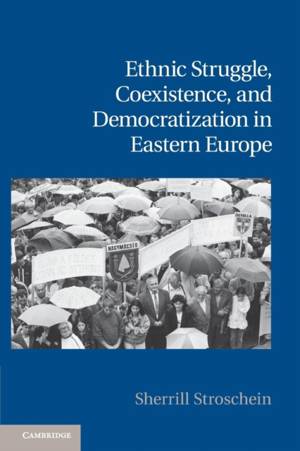
Door een staking bij bpost kan je online bestelling op dit moment iets langer onderweg zijn dan voorzien. Dringend iets nodig? Onze winkels ontvangen jou met open armen!
- Afhalen na 1 uur in een winkel met voorraad
- Gratis thuislevering in België vanaf € 30
- Ruim aanbod met 7 miljoen producten
Door een staking bij bpost kan je online bestelling op dit moment iets langer onderweg zijn dan voorzien. Dringend iets nodig? Onze winkels ontvangen jou met open armen!
- Afhalen na 1 uur in een winkel met voorraad
- Gratis thuislevering in België vanaf € 30
- Ruim aanbod met 7 miljoen producten
Zoeken
Ethnic Struggle, Coexistence, and Democratization in Eastern Europe
Sherrill Stroschein
€ 60,95
+ 121 punten
Uitvoering
Omschrijving
In societies divided on ethnic and religious lines, problems of democracy are magnified - particularly where groups are mobilized into parties. With the principle of majority rule, minorities should be less willing to endorse democratic institutions where their parties persistently lose elections. While such problems should also hamper transitions to democracy, several diverse Eastern European states have formed democracies even under these conditions. In this book, Sherrill Stroschein argues that sustained protest and contention by ethnic Hungarians in Romania and Slovakia brought concessions on policies that they could not achieve through the ballot box, in contrast to Transcarpathia, Ukraine. In Romania and Slovakia, contention during the 1990s made each group accustomed to each other's claims, and aware of the degree to which each could push its own. Ethnic contention became a de facto deliberative process that fostered a moderation of group stances, allowing democratic consolidation to slowly and organically take root.
Specificaties
Betrokkenen
- Auteur(s):
- Uitgeverij:
Inhoud
- Aantal bladzijden:
- 314
- Taal:
- Engels
- Reeks:
Eigenschappen
- Productcode (EAN):
- 9781107656949
- Verschijningsdatum:
- 1/05/2014
- Uitvoering:
- Paperback
- Formaat:
- Trade paperback (VS)
- Afmetingen:
- 156 mm x 234 mm
- Gewicht:
- 485 g

Alleen bij Standaard Boekhandel
+ 121 punten op je klantenkaart van Standaard Boekhandel
Beoordelingen
We publiceren alleen reviews die voldoen aan de voorwaarden voor reviews. Bekijk onze voorwaarden voor reviews.











